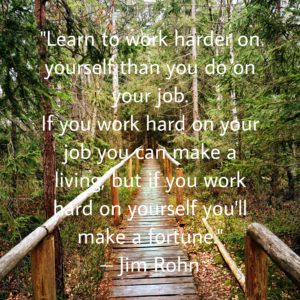Up until now, you are probably used to doing the work yourself. Naturally, because you know the most efficient way to get things done, you will tend to want to continue doing what you were doing. Your skills and dedication have gotten you where you are, so it is hard to turn that switch off. Nevertheless, now your job is to manage and lead people and you need to make them the center of your focus. This idea is especially hard for the doers. Starting something and finishing it gives you a sense of accomplishment, something palpable that you can point to as proof of your hard work. As a leader, you won’t have such clear deliverables. Your deliverable will be how happy your team is with their work, and as a result, how much they produce. It is hard to let go, but if you do not make that essential change, your team will view you as a micromanager and hoarder of accolades who has no desire to teach or empower those underneath you. I read a quote once that was along the lines of “do not be so focused on the goal that you forget about the people.” Unfortunately, I could not find it to quote here correctly, but it is a thought that has guided me in those moments in which I felt the pressure to deliver results, and I forgot that the only way to get there is by trusting those I lead.
If you are going to ask people to contribute and be proactive, you have to listen to them and try things even if you don’t think it is the way you would do it. Teamwork talk is cheap if, in your team, you are the only one making decisions. I had a manager once that, every time we came up with an idea, would say, “We already tried that and didn’t work.” Being a person with a lot of ideas, I felt shut down and eventually stopped contributing. Looking back, I appreciate the fact that he did not want to try things that had already failed because the efforts would have been a waste of resources. Nevertheless, when you have enthusiastic staff that really want to do something for the organization, you might have to pick your battles and let people do what they think is best. After all, just because it didn’t work for you does not mean that it is not going to work for someone else. Maybe that employee has some knowledge or skill that the team didn’t have when you tried before. If your experience was such that you know for sure that this is not going to work, think of ways to present your response in a manner that is educative and constructive. For example, these are the steps we took; these are the reasons why it didn’t work, is there anything you know that we didn’t at the time that might make this idea work? Can you do some research and get back to me with a proposal?
When you are a manager, those that work under you tend to project a lot and forget that you are a person too. Just like in parenting, in order not to disappoint those that expect so much from you, you have to keep it real. Yet our culture portrays a leader as someone who has all the answers and shows no weakness. I can’t help picturing those blockbuster movies showing a great leader in a moment of weakness having an epiphany that miraculously leads their team to success. This view fails to acknowledge that great leaders have fears and insecurities too and that their most significant achievements have come from being vulnerable and allowing those around them to support them in difficult times. As a manager, it is essential to have honest communication with your team, admit you made a mistake when you did, and apologize if this error affected them. Without breaking confidentiality or trespassing boundaries (yours and theirs), make them aware of your circumstances. Most employees will not have a clue about the number of responsibilities you carry on your shoulders, making assumptions about your performance based only on what they know. By allowing yourself to be vulnerable, you will enable them to support you and together create a better outcome.
This paradigm is one that is difficult to digest. Yet, one of the most common human relationships complaints is: “I trusted this person, but he stabbed me in the back.” This does not necessarily mean that people have an evil plan from the beginning (some do, but most don’t). It means that people change how they think about something based on how they see the world and how they feel about themselves and their circumstances. Therefore, someone who promises loyalty today and swears that they will never have a better boss than you can feel very different at any given moment. When people are at their best, they can be a delight to work with. When people are in a negative mindset, it will require that you are very well balanced and help guide this person back to a better place. A word of warning here; stay very attentive to those employees that are consistently negative and continue to exhibit toxic behaviors. Even if you invest time trying to get them out of the dark zone, they have deeper underlying issues that you cannot change, and it will do you no good to retain them. Let them go.
One of the most common things you hear from executive coaches is that the individuals they coach do not want to talk about feelings. Keep your problems at home, don’t cry at work, and other emotions numbing advice is something we learn early in our professional lives. Yet, all humans (except maybe for psychopaths) come with feelings pretty much as they come with a set of kidneys and lungs. Yes, emotions are there, and you might have learned to shut them down, but they will come out at some point, and they won’t look pretty. As a leader, you will have to live with a lot less than a 100% rate of approval. Your work and decisions will be criticized repeatedly, and this will take you through a bumpy ride, even if you know you are doing your best. It is essential that you have someone you trust, can be vulnerable with, and can speak about the effect these circumstances have on you. A mentor, a coach, a sensible friend, or a group of leaders like yourself can help you feel grounded and learn to know yourself better.
Most people that make it to management and leadership roles tend to be self-driven individuals. They perform very well at their jobs but do not necessarily have the introspection or guidance to determine whether managing people is something they are good at, something they want to learn, or just something that is not their strong suit. With the high cost of replacing talent and the current generation’s work dynamics (changing jobs often vs. being there for years), most companies understand that improving employee satisfaction matters. Yet, the prevailing culture continues to lag on proper mid-managing training. If there is any, they focus on the competencies, and company policies, but fail to teach the most essential skills of all: people and self-awareness skills.
I hope these tips are helpful, and if you feel stuck and don’t know where to begin, or if your company is looking to improve talent retention and I would be happy to chat with you about it. And don’t forget to share these tips with other leaders on the path to greatness!
I will leave you with a quote that many years ago spoke to me about the importance of self-awareness: “Learn to work harder on yourself than you do on your job. If you work hard on your job you can make a living, but if you work hard on yourself you’ll make a fortune.” ― Jim Rohn
With over 15 years of senior executive experience in the social service industry, Ivonne Zucco is the Founder and CEO of A Better Story Coaching, a life transition coaching service that aims to unlock the potential of diverse leaders, support individuals through their personal and professional growth, and to create a community of social influencers sharing their expertise for the benefit of all.

